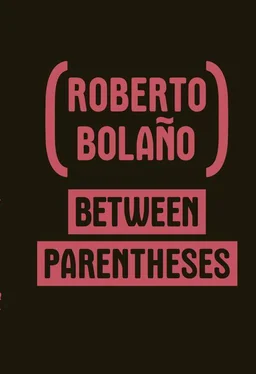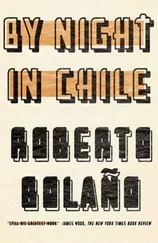Roberto Bolaño - Between Parentheses - Essays, Articles and Speeches, 1998-2003
Здесь есть возможность читать онлайн «Roberto Bolaño - Between Parentheses - Essays, Articles and Speeches, 1998-2003» весь текст электронной книги совершенно бесплатно (целиком полную версию без сокращений). В некоторых случаях можно слушать аудио, скачать через торрент в формате fb2 и присутствует краткое содержание. Год выпуска: 2011, Издательство: New Directions, Жанр: Публицистика, Критика, на английском языке. Описание произведения, (предисловие) а так же отзывы посетителей доступны на портале библиотеки ЛибКат.
- Название:Between Parentheses: Essays, Articles and Speeches, 1998-2003
- Автор:
- Издательство:New Directions
- Жанр:
- Год:2011
- ISBN:нет данных
- Рейтинг книги:4 / 5. Голосов: 1
-
Избранное:Добавить в избранное
- Отзывы:
-
Ваша оценка:
- 80
- 1
- 2
- 3
- 4
- 5
Between Parentheses: Essays, Articles and Speeches, 1998-2003: краткое содержание, описание и аннотация
Предлагаем к чтению аннотацию, описание, краткое содержание или предисловие (зависит от того, что написал сам автор книги «Between Parentheses: Essays, Articles and Speeches, 1998-2003»). Если вы не нашли необходимую информацию о книге — напишите в комментариях, мы постараемся отыскать её.
The Savage Detectives
Between Parenthese
Between Parentheses: Essays, Articles and Speeches, 1998-2003 — читать онлайн бесплатно полную книгу (весь текст) целиком
Ниже представлен текст книги, разбитый по страницам. Система сохранения места последней прочитанной страницы, позволяет с удобством читать онлайн бесплатно книгу «Between Parentheses: Essays, Articles and Speeches, 1998-2003», без необходимости каждый раз заново искать на чём Вы остановились. Поставьте закладку, и сможете в любой момент перейти на страницу, на которой закончили чтение.
Интервал:
Закладка:
And yet with the passage of the years it’s fair to ask whether the nightmare, or the skin of the nightmare, is really as radical as its exponents proclaimed. Many of them live much better than I do. In this sense, I can say that I’m an Apollonian rat and they’re starting to look more and more like angora or Siamese cats neatly deflead by a collar labeled Acme or Dionysius, which at this point in history amounts to the same thing.
Regrettably, Argentine literature today has three reference points. Two are public. The third is secret. All three are in some sense reactions against Borges. All three ultimately represent a step backward and are conservative, not revolutionary, although all three, or at least two of them, have set themselves up as leftist alternatives.
The first is the fiefdom of Osvaldo Soriano, who was a good minor novelist. When it comes to Soriano, you have to have a brain full of fecal matter to see him as someone around whom a literary movement can be built. I don’t mean he’s bad. As I’ve said: he’s good, he’s fun, he’s essentially an author of crime novels or something vaguely like crime novels, whose main virtue — praised at length by the always perceptive Spanish critical establishment — is his sparing use of adjectives, a restraint lost, in any case, after his fourth or fifth book. Hardly the basis for a school. Apart from Soriano’s kindness and generosity, which are said to be great, I suspect that his sway is due to sales, to his accessibility, his mass readership, although to speak of a mass readership when we’re really talking about twenty thousand people is clearly an exaggeration. What Argentine writers have learned from Soriano is that they, too, can make money. No need to write original books, like Cortázar or Bioy, or total novels, like Cortázar or Marechal, or perfect stories, like Cortázar or Bioy, and no need, especially, to squander your time and health in a lousy library when you’re never going to win a Nobel Prize anyway. All you have to do is write like Soriano. A little bit of humor, lots of Buenos Aires solidarity and camaraderie, a dash of tango, a worn-out boxer or two, an old but solid Marlowe. But, sobbing, I ask myself on my knees, solid where? Solid in heaven, solid in the toilet of your literary agent? What kind of nobody are you, anyway? You have an agent? And an Argentine agent, no less?
If the Argentine writer answers this last question in the affirmative, we can be sure that he won’t write like Soriano but like Thomas Mann, like the Thomas Mann of Faust . Or, dizzied by the vastness of the pampa, like Goethe himself.
The second line of descent is more complex. It begins with Roberto Arlt, though it’s likely that Arlt is totally innocent of this mess. Let’s say, to put it modestly, that Arlt is Jesus Christ. Argentina is Israel, of course, and Buenos Aires is Jerusalem. Arlt is born and lives a rather short life, dying at forty-two, if I’m not mistaken. He’s a contemporary of Borges. Borges is born in 1899 and Arlt in 1900. But unlike Borges, Arlt grows up poor, and as an adolescent he goes to work instead of to Geneva. Arlt’s most frequently held job was as a reporter, and it’s in the light of the newspaper trade that one views many of his virtues, as well as his defects. Arlt is quick, bold, malleable, a born survivor, but he’s also an autodidact, though not an autodidact in the sense that Borges was: Arlt’s apprenticeship proceeds in disorder and chaos, through the reading of terrible translations, in the gutter rather than the library. Arlt is a Russian, a character out of Dostoyevsky, whereas Borges is an Englishman, a character out of Chesterton or Shaw or Stevenson. Sometimes, despite himself, Borges even seems like a character out of Kipling. In the war between the literary factions of Boedo and Florida, Arlt is with Boedo, although my impression is that his thirst for battle was never excessive. His oeuvre consists of two story collections and three novels, though in fact he wrote four novels, and his uncollected stories, stories that appeared in newspapers and magazines and that Arlt could write while he talked about women with his fellow reporters, would fill at least two more books. He’s also the author of a volume of newspaper columns called Aguafuertes porteños [Etchings from Buenos Aires], in the best French impressionist tradition, and Aguafuertes españoles [Etchings from Spain], sketches of daily life in Spain in the 1930s, which are full of gypsies, the poor, and the benevolent. He tried to get rich through deals that had nothing to do with the Argentine literature of the day, though they did have something to do with science fiction, and they were always categorical failures. Then he died and, as he would have said, that was the end of everything.
But it wasn’t the end of everything, because like Jesus Christ, Arlt had his St. Paul. Arlt’s St. Paul, the founder of his church, is Ricardo Piglia. I often ask myself: What would have happened if Piglia, instead of falling in love with Arlt, had fallen in love with Gombrowicz? Why didn’t Piglia devote himself to spreading the Gombrowiczian good news, or specialize in Juan Emar, the Chilean writer who bears a marked resemblance to the monument to the unknown soldier? A mystery. In any case, it’s Piglia who raises up Arlt in his own coffin soaring over Buenos Aires, in a very Piglian or Arltian scene, though one that takes place only in Piglia’s imagination, not in reality. It wasn’t a crane that lowered Arlt’s coffin. The stairs were wide enough for the job. The body in the box wasn’t a heavyweight champion’s.
By this I don’t mean to say that Arlt is a bad writer, because in fact he’s an excellent writer, nor do I mean to say that Piglia is a bad writer, because I think Piglia is one of the best Latin American novelists writing today. The problem is, I find it hard to stand the nonsense — thuggish nonsense, doomy nonsense — that Piglia knits around Arlt, who’s probably the only innocent person in this whole business. I can in no way condone bad translators of Russian, as Nabokov said to Edmund Wilson while mixing his third martini, and I can’t accept plagiarism as one of the arts. Seen as a closet or a basement, Arlt’s work is fine. Seen as the main room of the house, it’s a macabre joke. Seen as the kitchen, it promises food poisoning. Seen as the bathroom, it’ll end up giving us scabies. Seen as the library, it’s a guarantee of the destruction of literature.
Or in other words: the literature of doom has to exist, but if nothing else exists, it’s the end of literature.
Like solipsistic literature — so in vogue in Europe now that the young Henry James is again roaming about at will — a literature of the I, of extreme subjectivity, of course must and should exist. But if all writers were solipsists, literature would turn into the obligatory military service of the mini-me or into a river of autobiographies, memoirs, journals that would soon become a cesspit, and then, again, literature would cease to exist. Because who really cares about the sentimental meanderings of a professor? Who can say, without lying through his teeth, that the daily routine of a dreary professor in Madrid, no matter how distinguished, is more interesting than the nightmares and dreams and ambitions of the celebrated and ridiculous Carlos Argentino Daneri? No one with half a brain. Listen: I don’t have anything against autobiographies, so long as the writer has a penis that’s twelve inches long when erect. So long as the writer is a woman who was once a whore and is moderately wealthy in her old age. So long as the author of the tome in question has lived a remarkable life. It goes without saying that if I had to choose between the solipsists and the bad boys of the literature of doom I’d take the latter. But only as a lesser evil.
Читать дальшеИнтервал:
Закладка:
Похожие книги на «Between Parentheses: Essays, Articles and Speeches, 1998-2003»
Представляем Вашему вниманию похожие книги на «Between Parentheses: Essays, Articles and Speeches, 1998-2003» списком для выбора. Мы отобрали схожую по названию и смыслу литературу в надежде предоставить читателям больше вариантов отыскать новые, интересные, ещё непрочитанные произведения.
Обсуждение, отзывы о книге «Between Parentheses: Essays, Articles and Speeches, 1998-2003» и просто собственные мнения читателей. Оставьте ваши комментарии, напишите, что Вы думаете о произведении, его смысле или главных героях. Укажите что конкретно понравилось, а что нет, и почему Вы так считаете.












